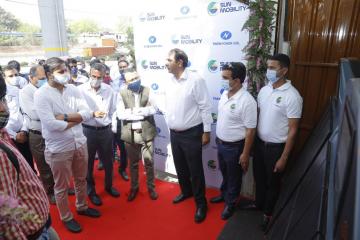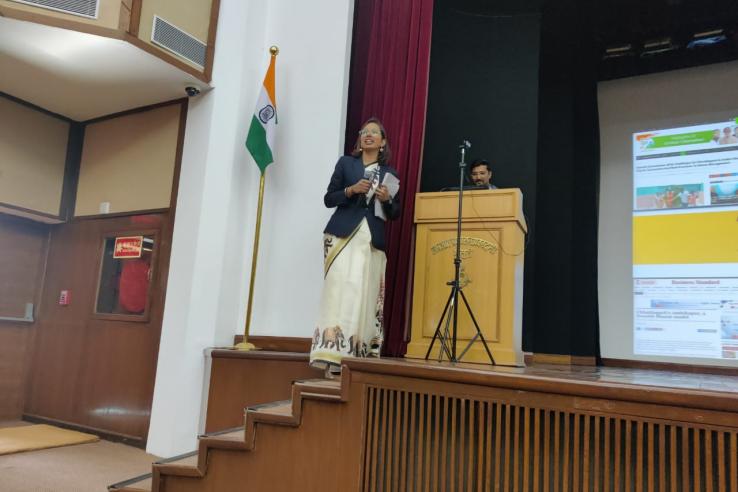
Alumni Voices from Government: Sweta Suman ‘18, Indian Administrative Service

I am a biochemical engineer by graduation from Indian Institute of Technology (BHU) Varanasi. Just like many engineers in India, I explored different areas other than my core education background before deciding on a particular field. After college, I worked in a political consultancy called Indian Political Action Committee (I-PAC) in Uttar Pradesh and Punjab state elections. Here, I gained some field and stakeholder management experience, which helped me in my work at J-PAL.
I joined J-PAL on the Jharkhand Electricity Project in February 2017, where I worked with the government-owned electricity distribution company (discom, i.e., JBVNL) to find ways to decrease their technical and commercial losses. We focussed on devising an all-encompassing auditing mechanism (including backchecks) on the bill generators and revenue collectors through the discom officials.
The role included primary data collection and extensive secondary data analysis to look at the reasons, focus areas, and solutions to the varied leakages. It also included field visits, public interactions, and continuous stakeholder management, starting from building relations with the partner and then growing into a formal MoU.
Working at J-PAL exhorted me to look at policy at a larger scale, and I desired to take the plunge to bureaucracy in order to participate directly in the government. Hence, I decided to prepare for the Civil Services Examination conducted by Union Public Service Commission of India.
Becoming an Indian Administrative Service (IAS) officer
If someone wishes to work in policy at a hands-on level, being an IAS officer provides the maximum opportunity. An IAS officer is part of the Civil Services or Indian bureaucracy, forming the backbone of policy design and implementation across administrative units. Starting from a field posting in the early years, IAS officers are later promoted to be head of different districts, to different ministries (such energy, health, education, etc.) at both the state and central level, to Secretaries, as they gain seniority and experience.
An IAS officer’s role is multifaceted, from revenue collection and administration at the district and subdivision level, to eventually shaping policy through different ministries/government entities. For example, J-PAL evaluations in India are often progressed in tandem with IAS officers at different levels in India. My own project with Jharkhand state’s discom was based on our partnership and interactions with the Managing Director of Jharkhand state discom, an IAS officer.
Currently, I am training to be an IAS officer and will be posted in Chhattisgarh, my cadre, in April 2021. My experience at J-PAL has helped at various stages, from the preparation phase for the exam to presently in the training phase, where I am volunteering teaching Research Methodology to fellow officer trainees in the academy.
The training process of an IAS officer is long and rigorous, beginning with a three-month Foundation Course for all civil services trainees taught at the Lal Bahadur Shastri National Academy of Administration (LBSNAA), which includes classes on public administration, economics, political concepts, management, law, and ICT. This is followed by a three-month Phase I training for just IAS officers, with sessions by subject experts and experienced field officers.
Bharat Darshan (India tour) follows the Phase I training. This includes an all-India tour to understand the functioning of different government institutions, organisations, and prominent NGOs. Then comes the 53-week District Training in our respective cadres to learn the nuances of the district administration like revenue administration, land administration, law, etc. After this, we have a five-week Phase II training at LBSNAA, along with a subsequent posting as Assistant Secretary with the central government. This concludes the long training process, after which we are posted in the states as Sub-Divisional Magistrates.
Applying research to policy
I see the learnings I gained at J-PAL to be guiding me at multi-fold levels of the job. To begin with, in the District Training period we have to undertake a research project as part of our dissertation. Here, I hope to execute a substantial research study for personal development as well as future policy actions in the state.
In my initial posting in Chhattisgarh, where I’ll be working on scheme implementation, revenue collection, administration, and overall public grievance redressal, I hope to channel the data available to identify the gaps and probable target areas. For example, as there is abundant data available at various levels, it can be used for different policy problems like digital health registry or helping patients in remote rural areas through telemedicine, targeted diagnosis through data analysis, and Machine Learning.
Eventually, at a senior level when I would be able to shape the design, planning, and implementation of policy, I envision employing research insights from J-PAL to guide my work. Similarly, I hope to continue learning at every step of the way so as to stay up-to-date and effective on the field of public policy.
My J-PAL experience and the interactions with researchers, senior leadership, and colleagues will always stay with me and guide me while I work on contributing towards the nation.


